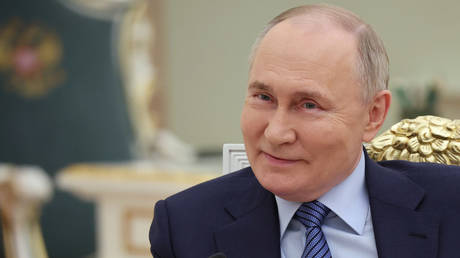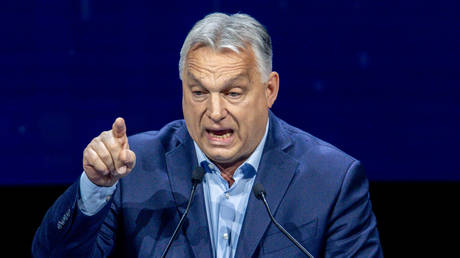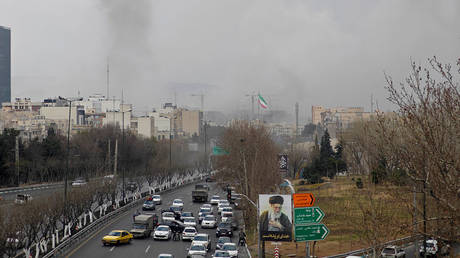
The final day of the Russian presidential election coincides with the anniversary of the utterly meaningless move against the incumbent
One year ago, on 17 March 2023, the International Criminal Court (ICC) issued two politically important – to put it neutrally – arrest warrants, one for Russian President Vladimir Putin, and the other for Maria Lvova-Belova, the Commissioner for Children’s Rights, a position within the Office of the President.
The warrants reflected that the ICC, to be precise its Pre-Trial Chamber following the court’s Prosecutor Karim Khan, found what it considered “reasonable grounds to believe that President Putin and Ms. Lvova-Belova bear criminal responsibility for the unlawful deportation and transfer of Ukrainian children from occupied areas of Ukraine to the Russian Federation.” Khan further argued that “these acts… demonstrate an intention to permanently remove these children from their own country.” In sum, the arrest warrants depicted an extensive kidnapping operation during wartime.
Public – and published – opinion in the West preponderantly celebrated the warrants as not only justified but salutary. They were supposed to promote the protection of civilians during war and put pressure on Russia by increasing its international isolation, a geopolitical aim that the West was struggling to achieve.
As the Wall Street Journal proclaimed, this was “the first time the leader of a nuclear superpower” was “called to account before the court, an independent institution established … to end impunity for war crimes, crimes against humanity and genocide.” The American President, Joe Biden, thought the ICC operation made “a very strong point.” Not to be outdone, reliably extremist Senator Lindsey Graham and equally reliably conventional publicist Fareed Zakaria both displayed historical illiteracy by absurdly claiming that Putin was copying Hitler. Historian here: Hitler’s victims would have disagreed.
Some Western commentators warned that the warrants were unlikely to be enforced and that convictions were even less likely. Yet such reservations did not challenge the overall Western consensus that the ICC move was both correct and, in some way, useful, even if mostly in a “symbolic,” that is, really, political manner.
Russian officials, unsurprisingly, responded very differently. They rejected both the charges as “null and void” and the jurisdiction of the ICC. Russia, like the US, is (after withdrawing in 2016) not a signatory state to the 1998 Rome Statute, on which the court is based. Hence, the decisions of the ICC have “no meaning for Russia,” as Maria Zakharova, the spokesperson of the Ministry of Foreign Affairs put it. Russia even started its own investigation against members of the ICC, and later Graham.
Russian commentators, as well as dissenting voices in the West, also denounced the ICC warrants as an abuse of judicial procedures for political purposes, amounting to a form of information war or lawfare against Russia. The Grayzone’s Jeremy Loffredo and Max Blumenthal, for instance, investigated the ICC’s evidence and found that it was fundamentally flawed. Their work was thorough, and their findings were detailed as well as, for the ICC and Karim Khan personally, deeply embarrassing.
The key point was that Khan had based much of his case on a report produced by the Humanitarian Research Lab (HRL) at Yale University, an organization “funded and guided” by the US State Department’s Bureau of Conflict and Stabilization Operations, an entity the Biden administration established in May 2022 to advance the prosecution of Russian officials.” In addition, the executive director of HRL, Nathaniel Raymond, started contradicting himself. Whereas he had initially made grandiloquent public statements in the Graham-Zakaria register – even including a bizarre reference to “genocide” – he greatly toned down his allegations once challenged by investigative reporters. No wonder, as the HRL report was weakly sourced, and its content actually contradicted Raymond’s inflammatory rhetoric.
In other words, the ICC prosecutor had relied on a tainted source that crudely served the information warfare purposes of Russia’s main geopolitical opponent, to such a degree that even its executive director ultimately got cold feet. That this badly undermined Karim’s case and his reputation as a professional needs no further belaboring. Washington will be Washington, but why should the ICC join it? If, that is, it seeks to be respected.
In legal terms, the cases have already been shown to be shoddy. They are unlikely to succeed, and not only because of practical and political obstacles, but, more importantly, because there is much more politics than evidence behind them. In terms of those politics, ironically, they have also failed: The warrants have not led to or increased the isolation of Russia or its president. If they have weakened anything, then it is the standing of the ICC, and, in particular, of its Prosecutor Karim Khan. The ICC is already struggling with a deserved reputation as a willing tool of Western geopolitics, while turning a blind eye to the West’s crimes. The attempt to engage in geopolitical lawfare on Russia during a Western proxy war against it has made this image problem worse. Whether a coincidence or not, the fact that one of the judges who issued the warrant for the Russian president has just become the ICC’s new president will only deepen this impression of bias.
Yet what has recently cast an especially harsh new light on the ICC’s campaign against Russia is a matter of comparison, namely between the ICC’s treatment of Russia and of Israel. And, to get a popular piece of nonsense out of the way: comparison is not “whataboutism.” Justice, and that is what courts are supposed to be about, cannot exist without consistency. To assess consistency requires comparison. The cry of “whataboutism” is merely the last refuge of the special pleaders, that is, those who want bias and thus injustice as long as it favors their own side.
As early as April 2023, another Grayzone piece of reporting found that Khan was stalling “the ICC’s case against Israel, frustrating human rights lawyers who represent the victims of grisly violence in the besieged Gaza Strip.” As critical lawyers pointed out even then, a court genuinely interested in the unlawful displacement of civilians, should have put decades of Israeli ethnic cleansing of Palestinians at the center of its activity.
In addition, the ICC stopped investigating American war crimes in Afghanistan. The US, in return, started displaying a favorable attitude – and offering generous financial support – to the ICC, which, previously, it had threatened with invasion in case it should ever dare prosecute Americans.
And all of that before Israel’s current genocidal campaign in Gaza, which began after the Hamas attack in early October 2023. Tel Aviv and its Western supporters – in criminal terms, which do apply here, accomplices – have pretended Israel has responded with a “war” on Hamas. But, in reality, everything – explicit Israeli statements, tactics, and, last but not least, the open display of sadism by many of its soldiers and civilians as well – show conclusively that this is not “war,” terrible as the latter is. Instead, this is a genocide executed with the purpose of ethnic cleansing, to be precise, the expulsion of Palestinians from Gaza (at least).
Prompted by South Africa, even the International Court of Justice – in a sense, the ICC’s “sibling” organization – has already recognized that genocide is at least a plausible possibility. It is important to understand that ICJ cases take years to conclude. At this point, a finding of a plausible possibility of genocide is the worst imaginable outcome for Israel already. In view of the fact that Tel Aviv has since then resolutely disregarded all the instructions the ICJ issued to restrain its assault, it is all the more likely that, in the end, Israel will be fully convicted.
And yet while the ICJ deals with cases between states, the ICC tries individuals – and has been conspicuous by its reticence to charge Israeli citizens. Critics have pointed out that the court and Khan himself have, once again, been very slow in reacting to Israel’s crimes. Mick Wallace, an Irish member of the European Parliament, has denounced Khan as a “pawn of US Empire” who has displayed pro-Israeli bias and cannot “be trusted to deliver justice.” Only Khan’s removal, says Wallace, could save the ICC from irrelevance. The BDS (Boycott Divestment Sanctions) movement, a key player in Palestinian and international resistance to Israel, has even accused Khan of being an accomplice to Tel Aviv’s genocide and, unsurprisingly, also called for him to be fired.
Only recently, as we are now looking back on half a year of unrelenting Israeli atrocities against the Palestinians in Gaza (and, as a matter of fact, elsewhere, too) have Khan and the ICC slowly started stirring themselves. Yet even now their efforts appear disingenuous. For instance, when finally appointing a prosecutor to lead the investigation into Israel’s actions against the Palestinians, Khan managed to find perhaps the worst candidate imaginable. Andrew Cayley is obviously well-embedded in the British establishment. He used to serve as the UK’s chief military prosecutor. He is a committed and open Conservative, while claiming that that does not tarnish his objectivity. Last but not least, according to The Guardian, Cayley “played a key role in a process that resulted in” the ICC giving up on a “long-running investigation into allegations that UK military personnel committed war crimes in Iraq.” Ask yourself: If you were Palestinian, would you expect fair treatment from a man with this CV?
As if to make things even worse for its own reputation, the ICC has recently added arrest warrants against two high-ranking Russian officers. In their case, the essence of the charges is that they are held responsible for attacks on infrastructure in Ukraine that, the court alleges, went beyond what humanitarian law permits. Really? The same court that has never issued similar warrants against US officers, while the comprehensive devastation of infrastructure – on a scale that Russia has not matched in Ukraine – is routine in American warfare? The same court that is dragging its feet over Israel’s assault on Gaza, which is all about mass killing of civilians not “only” directly but by the deliberate and virtually total destruction and crippling of infrastructure?
The ICC is neither promoting nor protecting human rights and international law. In reality, its obvious and indecently manifest political bias is undermining both. Is it possible that, one day, the ICC will change course, abandon its current role as an instrument of Western geopolitics, and finally do its job: pursue justice without bias? Maybe. No one knows the future. But one thing is predictable: If the ICC continues in what we might call the Khan mode of flagrant subservience, then it will become irrelevant, and soon.




